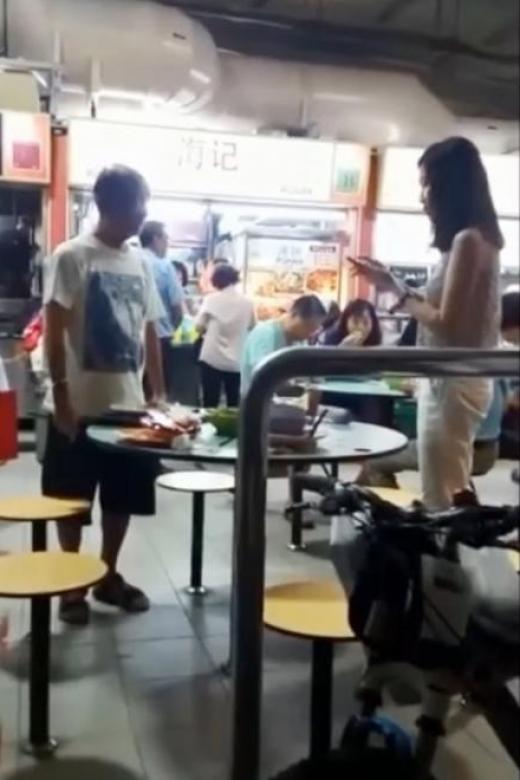But last Friday evening at a Toa Payoh hawker centre, this simple request by a 76-year-old man sparked such an ugly reaction by a couple that several people made police reports against them for allegedly abusing the man.
A video of the incident, which shows a man shoving an elderly man from behind so forcefully that he lurches forward, has gone viral.
Witnesses said the victim remained calm throughout the incident. He did not even tell his daughter, who only found out through social media.
While admitting that her father could be "a little stubborn, a little long-winded", she was shocked by the "violence" used against him, especially since he has a medical condition and would not be able to withstand a fall.
The couple have since been arrested by the police for an offence of public nuisance.
The smartly-dressed pair - a 46-year-old man and a 39-year-old woman - can be fined up to $1,000.
But the court of public opinion earlier tried to exact its own brand of "justice" by exposing the couple's identities.
Just hours after the video was uploaded, the netizen CSI team sprang into action to disgrace the couple, only to drag a wrongly-identified young woman into the muck-raking.
She was so distressed by the online attention that she made a police report.
United Overseas Bank, wrongly identified as the couple's employers, also issued a statement to clarify that the couple were not staff members of its Toa Payoh branch.
The incident may have been isolated, but it has also brought into focus our unique "chope" culture at makan places because the woman told the elderly man that the table, which has six seats, was "reserved".
Though some find the practice distasteful, let's be clear that "choping tables" is not on trial here.
It is ugly behaviour on the part of the couple for treating their victim with disdain, and that of the online lynch mob for maligning innocent parties.
"Choping", or reserving, seats and sharing a table with strangers at packed eating places are common Singaporean traits.
Some might think using a tissue packet, name card, or umbrella to "chope" a seat is an ugly manifestation of Singapore's "kiasu" culture.
But exceptions can be made, particularly for those dining alone who are worried about circling a crowded hawker centre for ages while carrying a loaded tray. Of course, solo diners are to share their table with others.
Perhaps more can be done to make table-sharing a more pleasant experience.
It could be as simple as adjusting the shape of the table (for instance, long, rectangular tables to signal that they are for sharing with strangers).
I also noticed the table in dispute was filled with dirty dishes. Perhaps the couple might have felt more inclined to share the table if it had more space?
At peak hours, it is humanly impossible for the cleaners, usually elderly folk, to clear the tables fast enough. Returning your trays, still hardly practised by diners here, should be encouraged, incentivised, or if needed, coerced.
Dr Amy Khor, chairman of the Hawker Centre 3.0 Committee, said last month that the National Environment Agency will work with cleaning contractors to dispel the misconception that clearing your trays will make cleaners jobless, as well as enhance tray-return facilities to make them more prominent and accessible.
Ultimately, it is about being gracious and, sadly, the couple were not. A witness claimed the man angrily dumped the dirty plates on the floor after the argument.
But let's take heart that graciousness lives on in our hawker centres. The victim eventually got to eat his food, thanks to a kind bystander who stepped in during the confrontation to offer him a seat at his table.







